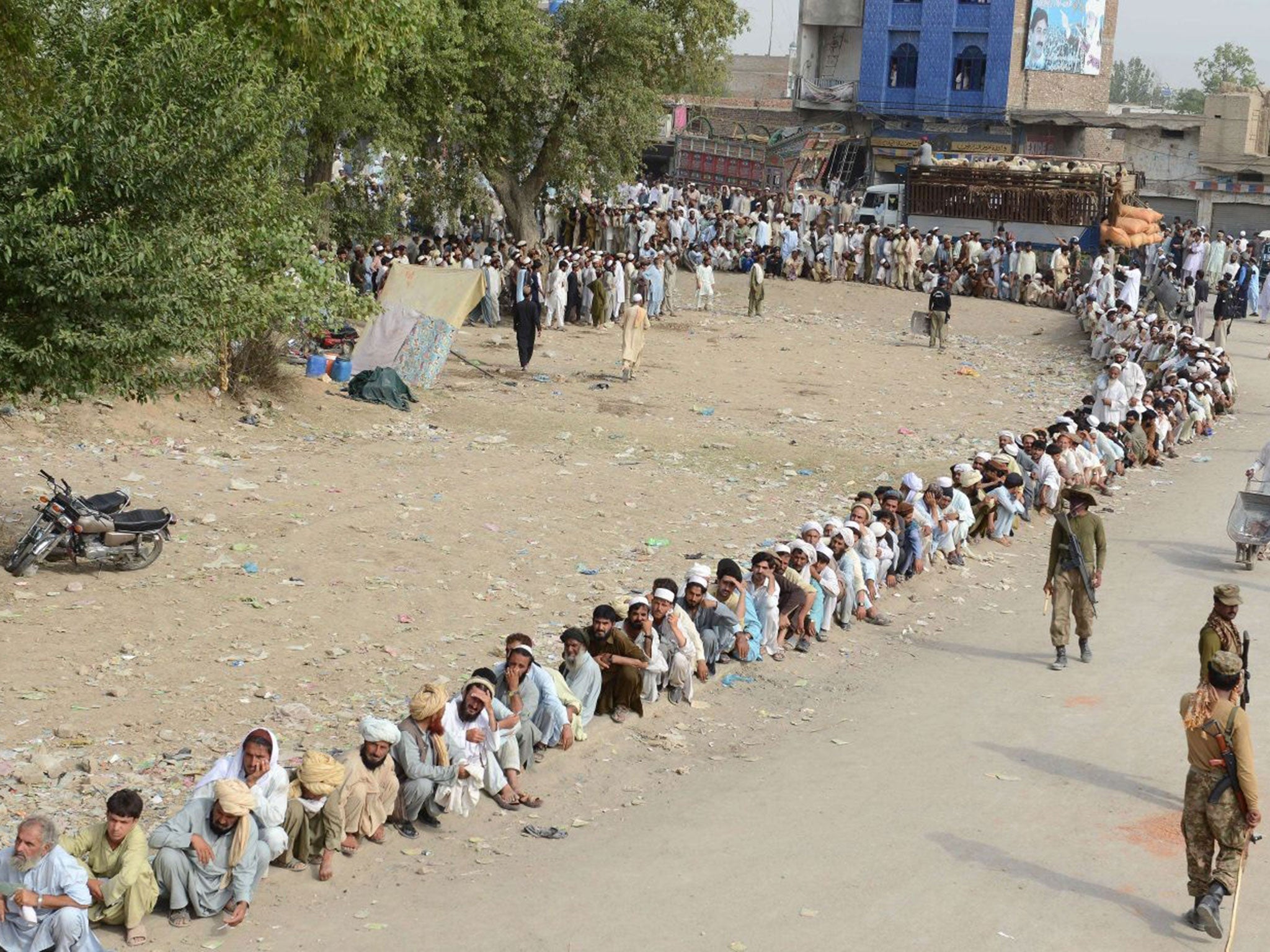Pakistan refugees: Little relief for families who fled army air strikes in North Waziristan
Aid effort falls woefully short with only one camp provided by the government and one province threatening to 'seal its borders' to the influx

Nor Niaza Hormuz walked for three days and two nights to escape the bombardments that hit her home in North Waziristan. Under a scorching sun, she took off from her home town of Miranshah with five children. By the time she reached Bannu, a neighbouring district where she had followed the thousands who had fled like her, she only had three children left.
“They died of fatigue,” she says. “And now, I do not know how to care for the rest of them.”
In the wake of a 15 June operation launched by the Pakistan Army in North Waziristian– which borders Afghanistan – up to 600,000 people have fled their homes. The operation was ostensibly launched in response to the 8 June attack against an airport in Karachi, Pakistan’s commercial capital, which was claimed by the Tehreek-e-Taliban Pakistan group and the Islamic Movement of Uzbekistan.
“We were not informed of the operation, and had to leave all of our belongings behind,” says Barmallah Khan, a white-bearded, 65-year-old man, while sitting at the edge of the hospital bed of an elder relative in Bannu’s civil hospital. “He collapsed when we arrived from Miranshah. He almost did not make the journey,” he said.
Major Asad, an army spokesman in Bannu, says that the army provided transport to those fleeing “for five or six days,” but was unable to say how many people he assisted. However, Khan, Nor, and several others says they were never offered transport, and were barely warned about the aerial bombings when the operation was launched.
In Bannu, hundreds stood in lines in front of a sports stadium, which until Wednesday was the only relief distribution point set up by the central government and the army.
Outside the sports stadium, men wrapped their faces in shawls to protect themselves from the blistering rays of the sun and the putrid smell of rotting rubbish.
Many said that they had been waiting in line since the early hours of the morning. The line was nevertheless straight as an arrow. Frustrated by men trying to push in, the army had earlier fired into the air and beat men back with sticks to force them to wait their turn.
“We do not want to hit them, but they leave us with no choice when they act like this,” says Khalid, a bandana-wearing soldier manning the centre. Khalid says he spent days distributing water and biscuits “with his bare hands” to the thousands who were fleeing North Waziristan.
Wearing a brown topi, or hat, and covered by a shawl, Shaudat Khan, from Muhammad Khel in Bannu, but who lives in North Waziristan, says that many people did not know whether they would receive a promised cash grant once they got to the other end of the line.
Though most have been given food, many have been refused the £7 guaranteed by the government because they did not have the correct paperwork.
Inside the sports stadium, white sacks of supplies lie piled at the centre. Muhammad Abbas, a representative of the Ministry of States and Frontier Regions, which is tasked with coordinating the effort between the civilian government and the army, has been at the distribution centre since 6.30am.
He has been attempting to coordinate civil and military distribution efforts. He says that the relief efforts have far to go, and admits that the government has built only one refugee camp.
“Honestly, it looks like a concentration camp,” says Abbas. Fearful of attacks by militants, and longing to avoid the sweltering heat, the 330-tent camp has only attracted 22 families, according to reports.
Chief ministers in at least two of Pakistan’s provincial governments announced that the refugees were not welcome. One said that he would “seal borders” to “stop the influx of over two million aliens” into his province. Though he has since retracted the statement, some analysts, like Rafia Zakaria, say that the statement reflects a tendency to see those from North Waziristan as “internally disowned Pakistanis”.
In the corner of a pale yellow distribution room reserved for women, Nor walks back to the corner that she has been waiting at for two days. Huddled around her as she steps back are her three surviving children – two sons and a daughter – who accompany her when she approaches all and sundry to ask for help.
She does not have an identity card proving that she lives in North Waziristan. Abid, a local organiser, explains that they have been feeding her and her children. However, in the eyes of the authorities, he says, she is effectively invisible.
Join our commenting forum
Join thought-provoking conversations, follow other Independent readers and see their replies
Comments